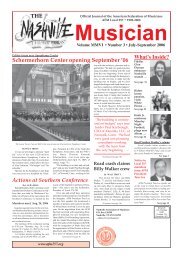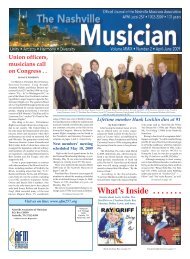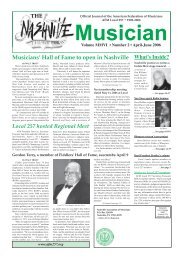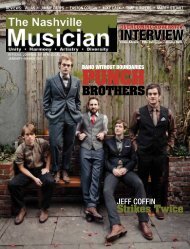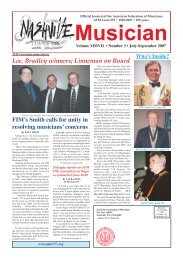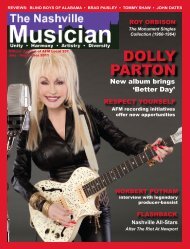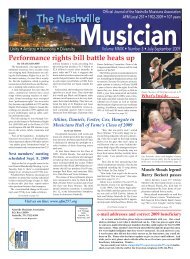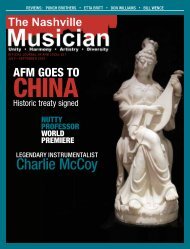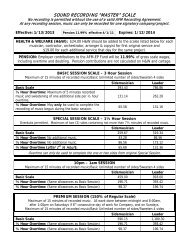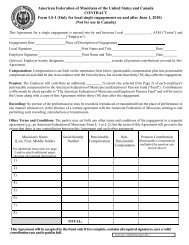Musicians Jan - 01 - Nashville Musicians Association
Musicians Jan - 01 - Nashville Musicians Association
Musicians Jan - 01 - Nashville Musicians Association
Create successful ePaper yourself
Turn your PDF publications into a flip-book with our unique Google optimized e-Paper software.
<strong>Jan</strong>uary-March 2009 The <strong>Nashville</strong> Musician 25<br />
Dean of <strong>Nashville</strong> guitarists to focus on AFM position<br />
Shortly after he succeeded guitarist Harold<br />
Bradley for Local 257’s presidential post, Dave<br />
Pomeroy summoned your editor to discuss the<br />
post-election edition. He suggested an article<br />
on Harold Bradley, citing his respect for his illustrious<br />
career and many years of service to<br />
Local 257 and the AFM.<br />
Dave recalled a time that he and Harold had<br />
worked together with Harold’s brother Owen<br />
Bradley, producing Brenda Lee at Bradley’s<br />
Barn in Mt. Juliet. The band included Buddy<br />
Harman, Floyd Cramer and Hal Rugg.<br />
“Cutting it all at once with that amazing<br />
band, Brenda’s vocal, 12 live strings and six<br />
singers, it was a sound and a feeling, I’ll never<br />
forget,” said Dave, who’s played on record with<br />
everyone from Emmylou Harris to Elton John.<br />
Harold and his wife Eleanor.<br />
Bradley’s amazing recording span began in<br />
1946 with his first session, accompanying Pee<br />
Wee King & His Golden West Cowboys to<br />
Chicago in mid-winter. This occurred three<br />
years after having hit the road the first time as a<br />
teen-ager on summer break from Isaac Litton<br />
High School, touring with Ernest Tubb’s Texas<br />
Troubadours.<br />
Born <strong>Jan</strong>. 2, 1926 in <strong>Nashville</strong>, Harold<br />
Ray Bradley first learned to play banjo<br />
(which came in handy in the 1950s playing<br />
Dixieland), and joined Local 257 at 16. After<br />
a U.S. Navy stint, Harold attended Peabody<br />
College on the Vanderbilt University campus,<br />
under the GI Bill.<br />
One of Harold’s more memorable early sessions<br />
was for King Records (1947), backing<br />
R&B favorite Ivory Joe Hunter: “In that recording<br />
session held at Castle Studios (in the old<br />
Tulane Hotel), I was the only white musician.<br />
Fact is, I’ve got that recording at home. Of<br />
course, they misidentified me on the record.<br />
They said it was Owen Bradley on guitar. I took<br />
it to Owen and said, ‘This is why you’re rich<br />
and famous, and I’m not. They keep getting us<br />
mixed up . . .’ And they did that on my first solo<br />
album (‘Misty Guitar’), identifying Owen as my<br />
guitar player, but as long as he and I knew who<br />
we were, it was OK.”<br />
Incidentally, mention of Castle reminds us<br />
that Harold, along with pianist Owen, drummer<br />
Farris Coursey, bassist George Cooper<br />
(then Local 257 president) and singer Snooky<br />
Lanson cut the first session in that historic studio<br />
- a commercial for Shyer’s Jewelers.<br />
Harold Bradley<br />
In 1952, Owen and Harold opened their Bradley<br />
Film & Recording studio downtown, and<br />
after a couple moves, bought an old house on<br />
16th Avenue, which with the addition of a<br />
quonset hut, they converted into a major recording<br />
facility (now owned by Mike Curb). Literally,<br />
it was the start of Music Row.<br />
Thanks to such A&R pioneers as Steve<br />
Sholes, Ken Nelson, Don Law, Chet Atkins and<br />
Owen, Harold became a first-call studio guitarist.<br />
As one of the heralded A Team of session<br />
players, he sat in with fellow pros Grady Martin,<br />
Hank Garland, Bob Moore, Floyd Cramer,<br />
Ray Edenton, Buddy Harman, Pig Robbins,<br />
Tommy Jackson and Charlie McCoy, all of<br />
whom played a part in developing the fabled<br />
<strong>Nashville</strong> Sound, which kept Music City humming<br />
along during the rock insurgence.<br />
“We didn’t realize we were making history,”<br />
said Harold, who did numerous sessions a day,<br />
sometimes sleeping on a cot in the studio. “We<br />
thought we would wake up one morning and<br />
this recording industry would be gone . . .”<br />
Harold participated in the recording of hits<br />
ranging from Ray Anthony’s 1952 fad “The<br />
Bunny Hop” to John Anderson’s “Swingin’,”<br />
1983 million-seller. Artists he’s played for include<br />
Hank Williams, Red Foley, Brenda Lee,<br />
Buddy Holly, Kitty Wells, Perry Como, Patsy<br />
Cline, Elvis Presley, Roy Orbison, Loretta Lynn,<br />
Conway Twitty, Tammy Wynette, Henry<br />
Mancini, Burl Ives, Roger Miller and Joan Baez.<br />
He’s also the picker who fostered the ’60s<br />
Tic-Tac style of playing guitar, reminiscent of<br />
Zeke Turner’s and Sammy Pruett’s earlier playing<br />
(on the bass strings). That was true later of<br />
Luther Perkins with Johnny Cash.<br />
Guitar Player magazine’s Jon Sievert called<br />
Bradley the world’s most recorded guitarist. He<br />
was especially proud to play on the Owen Bradley<br />
Quintet crossover Coral hit, “Blues Stay<br />
Away From Me,” recorded in 1949 (and according<br />
to Billboard, #7 country, #11 pop).<br />
Aside from his own solo albums, Bradley<br />
also produced veterans acts Slim Whitman and<br />
Eddy Arnold, and newcomer Mandy Barnett.<br />
His guitar stylings can be heard on some 40<br />
movie soundtracks, including a trio of Presley<br />
pictures: “Kissin’ Cousins,” “Clambake” and<br />
“Stay Away, Joe.”<br />
In union matters, George Cooper, Jr. was<br />
his mentor, having served 36 years, the longest<br />
of any Local 257 president. Of course, Bradley’s<br />
the second-longest serving leader with 18 years<br />
as president, and is equally proud of the constituency<br />
and how the union’s progressed.<br />
“If you think about what happened to<br />
Muscle Shoals (Ala.) and Memphis,” said<br />
Harold. “Their best players moved to <strong>Nashville</strong><br />
because they were being paid on a weekly salary<br />
and found out they could make as much in<br />
a three-hour union session here as they were<br />
making in a week. We got all the great players<br />
from those towns, whose recording has practically<br />
died as a result.”<br />
Harold was the first president of the National<br />
Academy of Recording Arts & Sciences’<br />
<strong>Nashville</strong> chapter, and also has served on the<br />
Tennessee Film, Entertainment & Music<br />
Commission’s advisory council. In 1990, he was<br />
elected president of Local 257, and has served<br />
as Trustee to the Board of Directors for AFM’s<br />
Employers’ Pension Fund, was president of the<br />
AFM Southern Conference, and in 1999, became<br />
the AFM’s International Vice President,<br />
a position he still fills.<br />
In 2006, Harold Bradley was inducted into<br />
the Country Music Hall of Fame, where Owen<br />
was enshrined in 1974, making them the only<br />
behind-the-scenes’ brothers inducted to-date.<br />
Harold became a charter member in the International<br />
<strong>Musicians</strong>’ Hall of Fame in 2007, along<br />
with fellow A Teamers.<br />
On Aug. 26, 2008, the Bradley family -<br />
Owen, Harold, Patsy, Jerry and Connie - were<br />
collectively acknowledged as Music Row’s First<br />
Family with Leadership Music’s Dale Franklin<br />
Award. (Patsy, long affiliated with BMI, and<br />
her brother Jerry, former RCA head, are the children<br />
of Owen. Connie Bradley, who heads up<br />
ASCAP-<strong>Nashville</strong>, is Jerry’s wife.)<br />
To what does Harold attribute his success?<br />
“Versatility. I think that was a big consideration<br />
. . . I played Dixieland on banjo; I play<br />
country; I’ve worked with (18) Rock & Roll<br />
Hall of Famers . . . I’ve gone all the way from<br />
Bill Monroe to Henry Mancini - and that’s a<br />
pretty good stretch, a wide variety of music. I<br />
would advise anyone coming up to play all different<br />
kinds of music, if they can.”<br />
Harold Bradley says ‘Thank you . . .’ to fellow members and staff<br />
Dear Members:<br />
As I leave this office as President of the<br />
<strong>Nashville</strong> <strong>Association</strong> of <strong>Musicians</strong>, Local 257,<br />
I will take many wonderful memories with me.<br />
I will always fondly remember the musicians,<br />
who supported me during the many trials<br />
and tribulations that occurred these past 18<br />
years.<br />
During my Presidency, I was privileged to<br />
watch the scale wages of the recording musicians<br />
grow from $6 million to $15 million a<br />
year. I’m proud of my role for negotiating with<br />
the gospel recording companies, resulting in<br />
their signing the recording agreement (SRLA).<br />
I also was involved in Symphony negotiations<br />
that raised the average wages from $19,000 a<br />
year to $52,000 a year.<br />
As a 67-year member, I was proud to see<br />
the Local go from a one-room office to owning<br />
outright its own building. I look forward to our<br />
new officers maintaining <strong>Nashville</strong>’s position<br />
as a major recording and entertainment center.<br />
I encourage all members to support their officers.<br />
After the 9-11 financial crisis of Local 257,<br />
I determined that I would stay until the Local<br />
was financially stable. I am proud to state that<br />
as of Dec. 31, 2008, the day I left office, Secretary-Treasurer<br />
Billy Linneman informed me<br />
that all of Local 257’s bills were fully paid.<br />
Speaking of former Secretary-Treasurer<br />
Linneman, I would like to say that Local 257<br />
and myself were truly blessed to have Billy<br />
Linneman as our Secretary-Treasurer for the<br />
past five-and-a-half years. Billy is not only<br />
musically and mathematically talented, he is a<br />
very honest, sincere and hard-working man.<br />
Thanks Billy!!<br />
I leave behind a dedicated staff of office employees<br />
who are the best of the best. They all<br />
know their jobs and are hard workers. Thanks<br />
staff! I love Local 257 and will still be representing<br />
its members as the International Vice<br />
President and as a Pension Trustee. Just stay in<br />
touch with me. You can visit my website<br />
BradleyHarold@ATT.net<br />
Fraternally yours, Harold Bradley<br />
Norm Ray<br />
Norm Ray waxes nostalgic<br />
Saxophonist Norm Ray has played on<br />
records for the likes of Elvis Presley (“I’m 1,000<br />
Years Old”), Paul McCartney (“Wide Prairie”),<br />
Willie Nelson (“Me & Paul” ), J. J. Cale (“Anyway<br />
the Wind Blows, The Anthology),” and Ray<br />
Stevens (“Everything Is Beautiful/Unreal!”),<br />
but numbers among his fondest memories a<br />
breakfast show he did at WSM.<br />
A Local 257 Lifetime Member, Ray remembers<br />
vividly playing on WSM’s Waking Crew<br />
program. Called the Crew’s “resident hippy,”<br />
Ray’s strong point was improvisations, including<br />
his character creation “Death Valley Norm.”<br />
Others who became regulars on the one-hour<br />
and 15-minute morning program over time, included<br />
hosts Dave Overton, singer Teddy Bart,<br />
Rhyming Weatherman Bill Williams, fellow<br />
newsman Mike Donegan (Donegan’s<br />
Doodlins’), bandleader Bill McElhiney, guitarist<br />
Jack Shook, trombonist Clarence (Dutch)<br />
Gorton, bassist George Cooper, Jr. (also Local<br />
257 president), singers Dottie Dillard, Delores<br />
Watson, clarinetist Harry B. Johnson (The Old<br />
Angler), singers Marty Browne, Carolyn<br />
Darden, Kay Golden, Tom Grant, saxophonist<br />
Jack Gregory, bassist Rex North, trombonistphotographer<br />
Beverly LeCroy, guitarist John<br />
Pell, drummer Terry Waddell, singer Darlene<br />
Austin, Professor Maxwell Lancaster (Dr.<br />
Philologue), Lou Muex (Prize Lady), pianistbandleader<br />
Joe Layne, trumpeter Ron Keller,<br />
sportscaster Larry Munson, sports director<br />
George Plaster, Ralph Emery succeeding Bart<br />
as M.C., and engineers Terry Farris and Chuck<br />
Sanford, among others.<br />
The popular program grew out of a Jack<br />
Stapp a.m. show titled Eight O’Clock Time, featuring<br />
music master Beasley Smith (known for<br />
hits “That Lucky Old Sun” and “Night Train<br />
To Memphis”). Launched in 1951, the spontaneous<br />
and wacky Waking Crew continued for<br />
more than 30 years, first broadcast from WSM<br />
Studio B, boasting a live audience. Other home<br />
bases: The Hermitage Hotel’s Grill Room, and<br />
the WSM TV studios (Knob Hill) in suburban<br />
<strong>Nashville</strong> (sans audience).<br />
Dutch Gorton, Local 257’s Secretary-Treasurer<br />
during his Waking Crew tenure, reportedly<br />
offered sage advice to promising musicians<br />
who hoped to succeed in Music City. When he<br />
picked up his instrument to join LeCroy, their<br />
“Twin Tombones” bit made them the Waking<br />
Crew’s best known act.<br />
According to an anniversary feature in the<br />
Columbia, Tenn., Daily Herald newspaper<br />
(dated March 21, 1982), saluting their high ratings:<br />
“While everyone makes his own contribution,<br />
some members of ‘The Crew’ are louder<br />
and zanier than others, and perhaps the title of<br />
Waking Crew Jester properly belongs to Norm<br />
Ray. Always quick with a quip, Ray is well<br />
known for his characterizations: The Vanderbilt<br />
Fan, The Belle Meade Belle, Death Valley Norm<br />
and The Senator. A master of accents, Ray can<br />
improvise a comic monologue from almost any<br />
situation.”<br />
Apparently both Ray and Joe Layne kept<br />
host Ralph Emery on edge due to their tendency<br />
to deliver off-color commentary. But Norm<br />
noted, “For just plain crude, Joe is the winner<br />
hands-down. My crude has a bit of finesse!”<br />
Aah, sweet nostalgia. -WT



